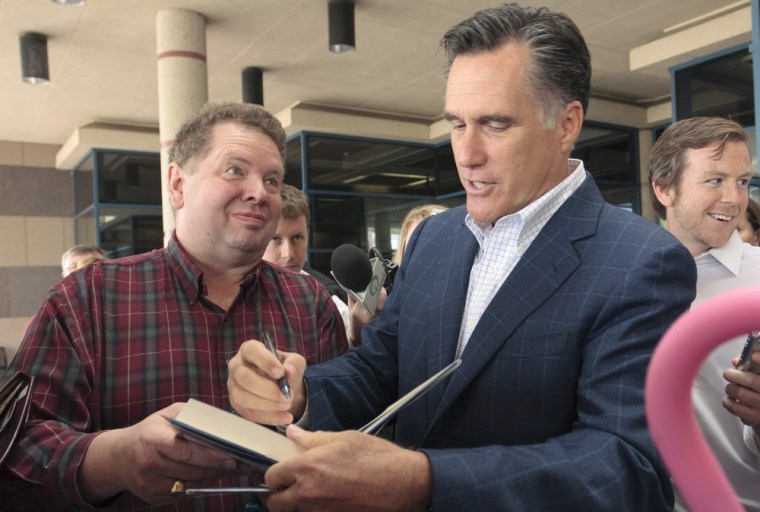In the first presidential election since the Tea Party's emergence, Republican candidates are drifting rightward on a range of issues, even though more centrist stands might play well in the 2012 general election.
On energy, taxes, health care and other topics, the top candidates hold positions that are more conservative than those they espoused a few years ago.
The shifts reflect the evolving views of conservative voters, who will play a major role in choosing the Republican nominee. In that sense, the candidates' repositioning seems savvy or even essential.
But the eventual nominee will face President Barack Obama in the 2012 general election, when independent voters appear likely to be decisive players once again. Those independents may be far less enamored of hard-right positions than are the GOP activists who will wield power in the Iowa caucuses, the New Hampshire primary and other nominating contests.
"The most visible shift in the political landscape" in recent years "is the emergence of a single bloc of across-the-board conservatives," says the Pew Research Center, which conducts extensive voter surveys. Many of them "take extremely conservative positions on nearly all issues," Pew reports. They largely "agree with the tea party," and "very strongly disapprove of Barack Obama's job performance."
Climate policy is a dramatic example of how GOP presidential hopefuls have shifted to the right in recent years. Former Govs. Mitt Romney of Massachusetts, Tim Pawlenty of Minnesota and Jon Huntsman of Utah, along with other likely candidates, have backed away from earlier embraces of regional "cap-and-trade" programs to reduce greenhouse gas pollution.
Such stands were unremarkable in GOP circles just a few years ago. Sen. John McCain, the 2008 presidential nominee, supported a cap and trade plan to place prices and limits on the emission of heat-trapping gasses.
'I'm sorry'
Now the position is anathema to millions of Republicans, and therefore to the party's candidates. Pawlenty is the most effusive in his backtracking. "I was wrong, it was a mistake, and I'm sorry," he says repeatedly.
The likely presidential candidates have shifted rightward on other issues as well.
Romney, who leads in most polls, has rejected his earlier stands supporting abortion rights, gun control and gay rights. He says his 2006 law requiring Massachusetts residents to obtain health insurance was right for his state at the time, but he has condemned the Obama-backed mandate that would cover all Americans.
Pawlenty campaigns as a tight-fisted conservative who would refuse to raise the nation's debt ceiling, even though many Republican leaders say economic chaos would ensue. Yet in 2006, Pawlenty told a newspaper, "the era of small government is over" and "government has to be more proactive, more aggressive."
Pawlenty says he was partly quoting another person. But in the same 2006 interview he said, "there are certain circumstances where you've got to have government put up the guardrails or bust up entrenched interests before they become too powerful."
Pawlenty has abandoned such talk in his presidential quest.
The Republican Party's rightward drift is causing headaches for the presidential hopefuls on the issue of Medicare, a potential minefield in the general election. House Republicans passed a bill that eventually would convert Medicare to a less costly, less generous program. It would help older Americans buy health insurance, but it no longer would provide benefits based mainly on a patient's needs rather than costs.
Presidential candidate Newt Gingrich touched off a firestorm by calling the plan radical. He spent the better part of a week trying to recant, change the subject and get his campaign back on track.
Pawlenty, after promising to offer his own Medicare plan, acknowledged conservatives' priorities and said he would sign the House measure if it were the only choice before him.
Romney hedged Friday on whether he would sign the House bill into law. "That's the kind of speculation that is getting the cart ahead of the horse," he said. "I'm going to have my own plan."
Many Republican activists are delighted by the rightward tack of their party and its presidential contenders.
If anything, "mainstream Republican leaders are pushing the party too far to the left," said Sid Dinerstein, GOP chairman in Palm Beach County, Fla. The House plan for Medicare is the only one that makes sense, he said, and GOP candidates "should become articulate and knowledgeable in talking about it."
'Wiggling all over the place'
Louisiana's Republican chairman, Roger F. Villere Jr., agrees.
"The conservative issues are the correct issues," he said. The presidential candidates should embrace the House stand, he said, and persuade voters they care more about saving Medicare than the Democrats do.
Some in Obama's camp, however, say the presidential contenders risk locking themselves into hard-right positions that won't play well when less ideological voters flock to the polls in November 2012.
Romney, Pawlenty, Gingrich and others "are wiggling all over the place" to appease staunch conservatives, said Bill Burton, Obama's former spokesman and now a Democratic fundraiser and advocate. Americans want strong, consistent leaders, he said, and the Republican contenders aren't filling the bill.
Obama, of course, has had his own inconsistencies, such as backing away from calls to increase payroll and income taxes on the wealthy.
Moreover, competitive Democratic primaries are usually the mirror image of GOP contests. Democratic candidates generally edge to the left to attract liberal activists before hewing back to the center for the general election.
This time, however, Obama has no primary opponents to worry about. That allows him to focus on the all-important independent voters, who swung the 2008 elections to Democrats, and the 2010 midterm elections to Republicans.
The latest Pew Research study suggests that independents, who "played a determinative role in the last three national elections," will have even more clout in 2012. They comprised 30 percent of the national electorate in 2005, Pew found. They now make up 37 percent.
Whoever survives the conservative-dominated Republican nominating process will have to address those independents' concerns quickly and adroitly.
